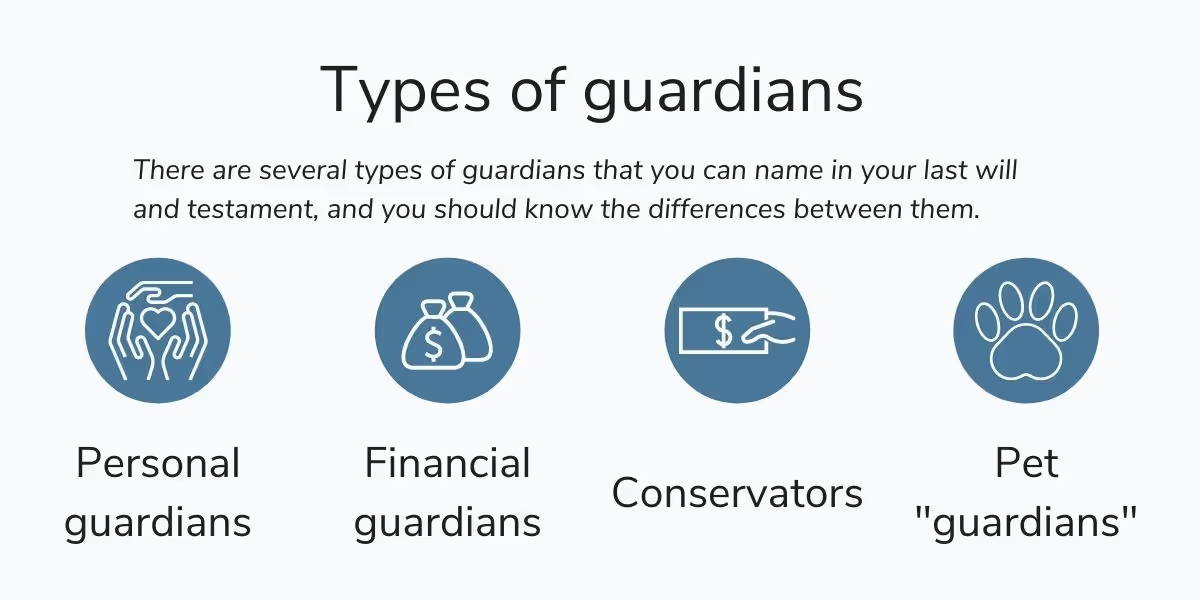There are several types of guardians that you can name when you make a will. If you're the parent of a minor child or disabled adult, you may want to nominate a guardian for your kid in case both you and the other parent pass. Or if you own a pet, you may want to name a caretaker for them.
Nominating guardians for your dependents and pets are one of the best ways you can make sure they're cared for by people you trust. When you don't name guardians, the courts won't know what your wishes are and will choose for you.
But before you name legal guardians, you should know what the differences are between the four types: personal guardians, financial guardians, conservators, and pet “guardians” (caregivers named as beneficiaries). Each of these has different responsibilities and legal authority.

There are also different levels of responsibility for guardianship.
- Full guardianship: Complete decision-making authority and responsibility for another person, such as a child under 18
- Limited guardianship: Responsibility is given for specific needs, such as property
- Joint guardianship: Responsibility is held along with another person
Here are the four types of guardians you should know before getting started on your last will and testament:
1. Personal guardians
A personal guardian is also known as a custodial guardian or guardian of the person. And if you’re a parent of a minor child (usually under 18), then you should know what it means to nominate a personal guardian in your will.
Guardianship laws vary by state. Generally speaking, however, personal guardians are granted legal authority and responsibility to provide for the care, custody, and upbringing of another person, who is known as their "ward." Wards are usually minor children, but incapacitated adults can also become wards.
Personal guardians' responsibilities are like a parent's. They must attend to their ward’s daily and longer-term needs. These include food, housing, education, clothing, and healthcare.
Most of the time, when a minor child’s parent dies, custody will go to the surviving parent. But if there isn’t a surviving parent, it’s a good idea to have someone you trust named in your will. When you don't nominate a guardian, and there is no surviving parent, then the court will have to choose one for you.
To name this type of guardian for a minor child in your will, you can either speak with an attorney or make your will with an online tool like FreeWill. On our site, we ask if you’re the parent of a minor child, and then give you the option to specify guardianship. You can even name multiple guardians in order of succession in case the first ones you name aren’t able to serve. Parents of children with special needs should speak to an attorney when making their estate plans.
2. Financial guardians
Depending on your family situation, you may want to name a financial guardian as well as a personal guardian for your child. Financial guardians are also known as property guardians, guardians of the estate, or, in some contexts, conservators (we go over this difference in the next section).
This type of guardian is given the legal authority to manage your minor child’s money and/or property, and the legal duty to do so for their benefit and care.
A financial guardian is usually the same person as the personal guardian. However, some people prefer to give a different person the ability to handle their child's inheritance.
Like with personal guardians, the surviving parent will be your children’s financial guardian by default. If you don’t want this to happen, you should speak to an attorney in your state. In the case that there isn't a surviving parent, and you haven't named a financial guardian, then the personal guardian may take on this role.
3. Conservators
In some states, a conservator is the same thing as a financial guardian. They manage the finances and property of minor children or incapacitated or disabled adults. In other states, conservatorship only refers to guardians for incapacitated adults, and not minor children.
An incapacitated adult is someone that a court has determined is unable to make important decisions about their own life. For example, they could have had a stroke, suffer from dementia, or be in a coma.
A conservator’s duties can range from paying bills and taxes for their ward to providing for their education and well-being. If you need to name this type of guardian in your will for an adult dependent, you may want to speak to an attorney. You should also be aware that if your dependent already put a financial power of attorney in place before becoming incapacitated, then it may be unnecessary to name a conservator.
4. Pet “guardians”, aka caregivers
In the eyes of the law, a “pet guardian” isn’t actually a type of guardian. Pets are technically considered property and included in your estate. But if you have a pet, you probably consider them to be an important part of your family and want to make sure they're taken care of if you die.
To name a caretaker for a pet in your will, you simply need to name someone as a beneficiary for your pet. A beneficiary is someone to whom you leave a part of your estate.
When you do this, you can also include a note to your beneficiary to let them know how you want your pet to be cared for. And you can leave your beneficiary money to take care of your pet. However, the money you leave to a caregiver for this purpose will be a request, and not a legally binding obligation. If you want to make sure the money is used for your pet’s care, you should speak to an estate planning attorney about a pet-care trust.
Make your free estate plan today

Make your free advance healthcare directive

Make your free durable power of attorney

Make a stock donation today

Make your free revocable living trust










